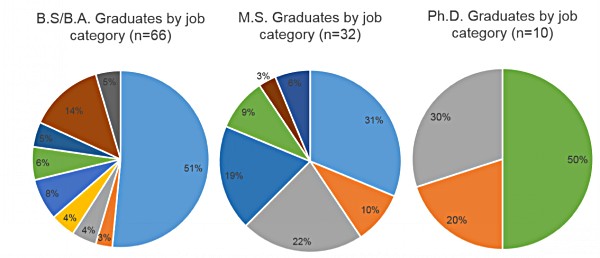Basic statistics for awards from FY 2001 to FY 2011
| Number of students graduated | 79 B.S./B.A., 33 M.S./M.A. and 15 Ph.D. |
| Number of students trained by the Center | 207 B.S./B.A., 79 M.S./M.A. and 35 Ph.D. |
| Percentage of graduates from underrepresented groups | 85% of B.S., 46% of M.S., and 80% of Ph.D. graduates are from URM groups |
| Number of K-12 students impacted by LMRCSC programs | 7,656 students |
| Number of students that earned internships | 44 students interned at NOAA labs; 27 at LMRCSC partner institutions and other universities |
| Number of presentations by students and faculty | 574 (437 by students) presentations at scientific meetings |
| Number of peer-reviewed articles and book chapters published | 167 (83 of these included students) |
The LMRCSCs four thematic areas for research include quantitative fisheries, essential fish habitat, fisheries economics and aquaculture, developed mostly in collaboration with NOAA scientists. This research is contributing information needed for the protection, restoration and enhancement of coastal and marine fish habitats and fish stocks.
Center research has contributed or will contribute information needed for the protection, restoration, and enhancement of coastal and marine fish habitats and more than 20 species of fish and shellfish (e.g. black sea bass, Chinook salmon, monkfish, northern rock sole, blue crabs, and deep sea red crabs) and protected species (e.g. loggerhead sea turtles).
Graduates by Sector and Field of Work
Learn more about which sectors and fields of work where our graduates have obtained professional work. The data below, collected in Spring 2016, reflects the portion of NOAA LMRCSC graduates for which we currently have employment information.



The Center has post-graduation information for 66 of our 79 B.S./B.A. graduates. Half of the students who obtained B.S./B.A. degrees have reported enrolling in graduate programs (51%). Others are employed by NOAA or NOAA contractors (3%), non-NOAA federal agencies (4%), state and local agencies (4%) and NGOs (8%), and in universities as technicians/biologists (6%). Some of the Center graduates are also employed in K-12 education (5%) or work in science or engineering for private organizations (14%) or are doing other jobs (5%).
The Center has post-graduation information for 32 of 33 M.S. graduates. Our most recent information about these 32 graduates indicates that 30% are currently enrolled in Ph.D. programs. Other M.S. graduates work for NOAA or NOAA contractors (10%), in universities as biological technicians (9%), for other federal agencies (22%), for NGOs (19%), or as professionals in NOAA related sciences (3%) or are doing other jobs (6%).
Of the 15 students who received Ph.D. degrees from the LMRCSC, we have post-graduation information for 10 of them. Five doctoral alumni are working in universities, two are working for NOAA or NOAA contractors, and three are working for other federal agencies.
Leveraged Funds
- CREST-Center for the Integrated Study of Coastal Ecosystem Processes (CREST-CISCEP)
- Professional Science Masters program in Quantitative Fisheries and Resource Economics
- Research Experiences for Undergraduates in Marine and Estuarine Science
- Network of Cooperative Science Centers for Recruiting and Training High School Students in Geosciences
- Brad Stevens and Wilmelie Cruz (student) earned $358K from the NOAA Saltonstall-Kennedy program
- Brad Stevens and Cara Schweitzer (student) earned $216K from the Atlantic Coastal Fish Habitat Partnership
- Gulnihal Ozbay and Dennis McIntosh received a $300K National Science Foundation (NSF) grant for CCEP-II MADE-CLEAR Maryland-Delaware Climate Change Education, Assessment and Research
- Deidre Gibson earned several NSF grants, to study the Cryptic Diet of the Doliolids research project ($200K) and for the Partnership in Research and Education Materials ($3M)
For a full list of leveraged funds, view the Center’s Semi-Annual Report.
Success Stories
- Masonry fish magnet: Marine researchers aim to nurture sea bass habitat (Feb. 23, 2017)
- $20.5 million to help assure future of underrepresented groups (Jan. 5, 2017)
- LMRCSC alumna introduces NOAA’s Ocean Today (Dec. 14, 2016)
- SSU professor assists in sea turtle hatching (Sept. 9, 2016)

NOAA Living Marine Resources Cooperative Science Center
University of Maryland Eastern Shore (Lead Institution)
(410) 651-7870
Award numbers: FY 2011 Award #NA11SEC4810002
Funding Agency: NOAA Educational Partnership Program
This website is best view in Chrome or Firefox browsers.


